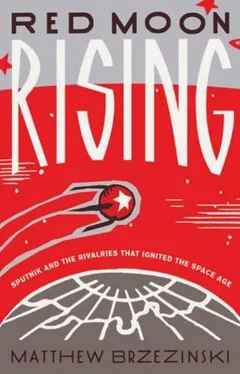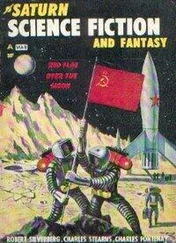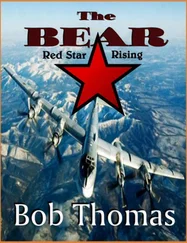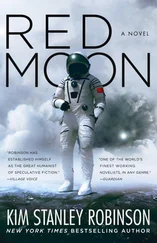265 “The searchlights are going on and lighting up the vehicle”: Time, February 10, 1958.
“There is nothing that I have ever encountered”: Medaris, Countdown for Decision, p. 212.
“When the countdown reaches zero, the bird will not begin to rise immediately”: Time, February 10, 1958.
266 “Go, baby! Go!”: Harris, A New Command , p. 189.
“No. Let ’em sweat a little”: Time , February 10, 1958.
267 “I’m out of coffee and running low on cigarettes”: Harris, A New Command , p. 189.
“Do you hear her?”… Do you hear her now?”: Bergaust, Wernher von Braun , p. 278.
“Wernher, what’s happened?”: Ibid.
“ Goldstone has the bird! ”: Medaris, Countdown for Decision, p. 224.
269 “It represented only a symbolic counter threat to the United States”: Nikita Khrushchev, Khrushchev Remembers , vol. 2, p. 80.
“It would have been better to dump them in the sea”: Nash, The Other Missiles of October, p. 3.
270 “It is entirely possible that having a failure in the oxygen equipment”: http://www.eisenhower.archives.gov/dl/u2incident/departmentstatementonU25560.pdf.
at 8,500 feet by grappling hooks attached to the front of a C-119 military plane: Taubman, Secret Empire, p. 321.
271 “Those friggin missiles”: Nash, The Other Missiles of October, p. 3.
a catastrophic explosion: Mikhail E. Kuznetsky, Bajkonur, Korolev, Yangel (Voronezh: Voronezh, 1997), p. 127.
272 So poor were the harvests that the Soviet Union faced food shortages: Medvedev and Medvedev, Khrushchev , pp. 118-19.
197 of the 200 full members: Ibid., p. 172.
273 Soviet industrial growth began to slow dramatically in the mid-1960s: Haines and Leggett, eds., CIA’s Analysis of the Soviet Union , 1941–1990, p. 191.
“I did everything I could to patch up their friendship”: Nikita Khrushchev, Khrushchev Remembers, vol. 2, p. 79.
the cause of death was complications during routine surgery: Harford, Korolev, p. 279.
274 more commonly known as the Scud: Russian Arms Catalog, vol. 4, Strategic Missile Forces (Moscow: Military Parade Publishers, 1997), pp. 44-45 (in English).
because he refused to endorse escalating America’s involvement in Vietnam: http://www.gwu.edu/~erpapers/mep/displaydoc.cfm?docid=erpn-stusym.
275 “You want to threaten? We will answer threats”: Dunar, America in the Fifties, p. 294.
The hidden hand : Greenstein, The Hidden-Hand Presidency, p. vii.
a reevaluation that coincided, in part, with the declassification: Dunar, America in the Fifties, p. 326.
276 His farewell address to the nation in January 1961: Eisenhower, Waging Peace, p. 615.
Donald Quarles… was to have succeeded Neil McElroy as secretary of defense in 1959: http://www.arlingtoncemetery.net/donaldau.htm.
Joseph P. Kennedy offered Medaris a job: Harris, A New Command , p. 213.
he accepted the presidency of the Lionel Corporation: Ibid., p. 216.
he was ordained an Episcopal priest: Ibid., p. 254.
Paris Match , the glossy French magazine, published a glowing article: Piszkiewicz, Wernher von Braun, pp. 163-64.
Arthur Rudolf… was quietly extradited to West Germany: Simpson, Blowback, p. 39.
278 it supplies the boosters that orbit private U.S. satellites: Author telephone interview with Paula Korn, Sea Launch Public Affairs Office, November 11, 2005.
Though my name is on the cover, this book is really the product of two brilliant minds. It was conceived by Scott Waxman and Paul Golob, who cajoled, conspired, and finally convinced me that I was the right person to write it. And for this I am eternally grateful—both for their collective wisdom and for their confidence.
Scott is the personification of the proactive agent, and I’m truly lucky that he represents me. Paul is the best editor I’ve ever worked with: cerebral, classy, and a man of his word. His guiding hand can be felt throughout the manuscript, and his uncanny ability to see the big picture has endowed this project with whatever weight it has. As with Scott, I count myself fortunate to have worked with him.
At Times Books and Henry Holt, a number of other people have made this book possible: first and foremost, John Sterling, whose patronage has been instrumental. David Wallace-Wells, Chris O’Connell, Jessica Firger, Claire McKinney, Maggie Richards, and Nick Caruso also richly deserve praise. They are responsible for the finished product and its placement in bookstores. Farley Chase of the Waxman Agency has also been responsible for shaping this book, and he has worked tirelessly developing its audio and foreign editions. I owe him thanks, in several languages.
In the course of my research, I have greatly benefited from the accumulated knowledge of Peter Gorin, who is probably the leading civilian expert in the United States on Soviet space and missile programs. Peter’s encyclopedic memory and vast archive of Russian scientific materials are the driving force behind the technical sections of the book. I would also be remiss if I did not thank Sergei Khrushchev, whose memory and recollections form the foundation for some the book’s best action scenes. Professor Khrushchev—himself a rocket scientist, and one of the only surviving eyewitnesses to many of the events depicted in the text—was exceedingly generous with his time, and I owe him a great debt for sharing his political insights as well.
On the political front, Eric Rubin—a friend, senior foreign service officer, old Russia hand, and student of history—nudged me whenever I strayed in trying to make sense of American domestic and cold war politics in the 1950s, and I am grateful for his counsel. In re-creating the political dynamics of the era, I’ve also relied on the accrued wisdom of many American scholars and space historians. They are too numerous to cite here, but I’ve made a point of acknowledging their contributions whenever possible within the body of the text.
And last, but certainly not least, I want to thank Roberta, my muse, critic, fan, editor, and better half. She makes everything possible.
A-10 rocket, 15–16
ABC TV, 90–91, 234
Abramov, Anatoly, 151
Acheson, Dean, 141
Adams, Sherman, 55–56, 169, 171, 221, 231–32, 243
Adlershof research institute, 6–7
Advanced Research Projects Agency (ARPA), 223, 274
Aerojet-General Corporation, 226
agriculture, Soviet, 37–39, 272–73
Air Force, U.S.bombers and, 57–59
ICBMs and, 79–81
intelligence, 58–59
IRBMs and, 51–52, 129
missile budget, 132
spy satellites and, 133–34, 180, 185, 249–51
U-2 and, 119–20, 126, 130
Air Force Ballistic Missile Division, 51
“Air Power” hearings (1956), 56–58, 79, 183, 214
Air War College, 82
Alaska, 129
Albania, 193
Alsop, Joseph, 252
Alsop, Stewart, 252
Ambrose, Stephen, 139, 229
American Rocket Society, 223
Anderson, Clinton, 248
Anderson, Robert, 223
Andropov, Yuri, 75
anticommunism, 23, 57, 88–89
Apollo spacecraft, 277
Arbenz, Jacobo, 118
Arkansas National Guard, 139
Armstrong, Neil, 275
Army, U.S., 8–12, 51, 86, 89, 132–34, 249
Army Air Corps, U.S., 46–47
Army Ordnance, U.S., 238
Army Ballistic Missile Agency (ABMA, Huntsville), U.S.
cut out of ICBM program, 79–83, 89–90
Читать дальше












